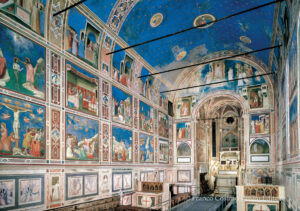How a Jewish lawyer protected Giotto frescoes when they were being sold to a foreign company
 The exquisite fresco cycle painted between 1302 and 1397 by different artists in the northern Italian city of Padua has been added to Unesco’s World Heritage List on Saturday. The accomplishment was welcomed in Italy with enthusiasm. “The proclamation is a cause for joy and pride for the whole country”, stressed the Prime Minister Mario Draghi. The frescoes, which include the stunning Giotto’s Scrovegni Chapel cycle and are set in within building of diverse functions, are well known around the world.
The exquisite fresco cycle painted between 1302 and 1397 by different artists in the northern Italian city of Padua has been added to Unesco’s World Heritage List on Saturday. The accomplishment was welcomed in Italy with enthusiasm. “The proclamation is a cause for joy and pride for the whole country”, stressed the Prime Minister Mario Draghi. The frescoes, which include the stunning Giotto’s Scrovegni Chapel cycle and are set in within building of diverse functions, are well known around the world.
Less known is that it was a great Padua Jewish mayor in the early 1900s – Giacomo Levi Civita – to make the difference. In his youth a fervent Garibaldian patriot, Levi Civita made it possible for the Scrovegni Chapel to be entrusted to the municipality, so providing it with protections and safeguards that otherwise would have not been granted.
“As rumors spread that the Foscari family wanted to sell Giotto’s frescoes to a foreign company, the Municipality began a long series of expropriation attempts with no success. They resorted to a ‘trick’, as its creator itself, Levi Civita, then a young lawyer, called it. He maintained, on behalf of the Fabbriceria degli Eremitani, the claims of the administration for custody of the Chapel […] and finally managed to prove, through a large number of documents, testimonies and a highly trusted closing speech, that since its foundation the Chapel was intended for the public”. Therefore, the inappropriateness to entrusting it to privates.
It was among the most brilliant achievements by this great historical figure, who was also a senator of the Kingdom of Italy and will be the center of the dossier in the next issue of Pagine Ebraiche dedicated to past, present, and future of Jewish Padua also in connection to the upcoming European Day of Jewish Culture of which Padua will be the lead city in Italy.
